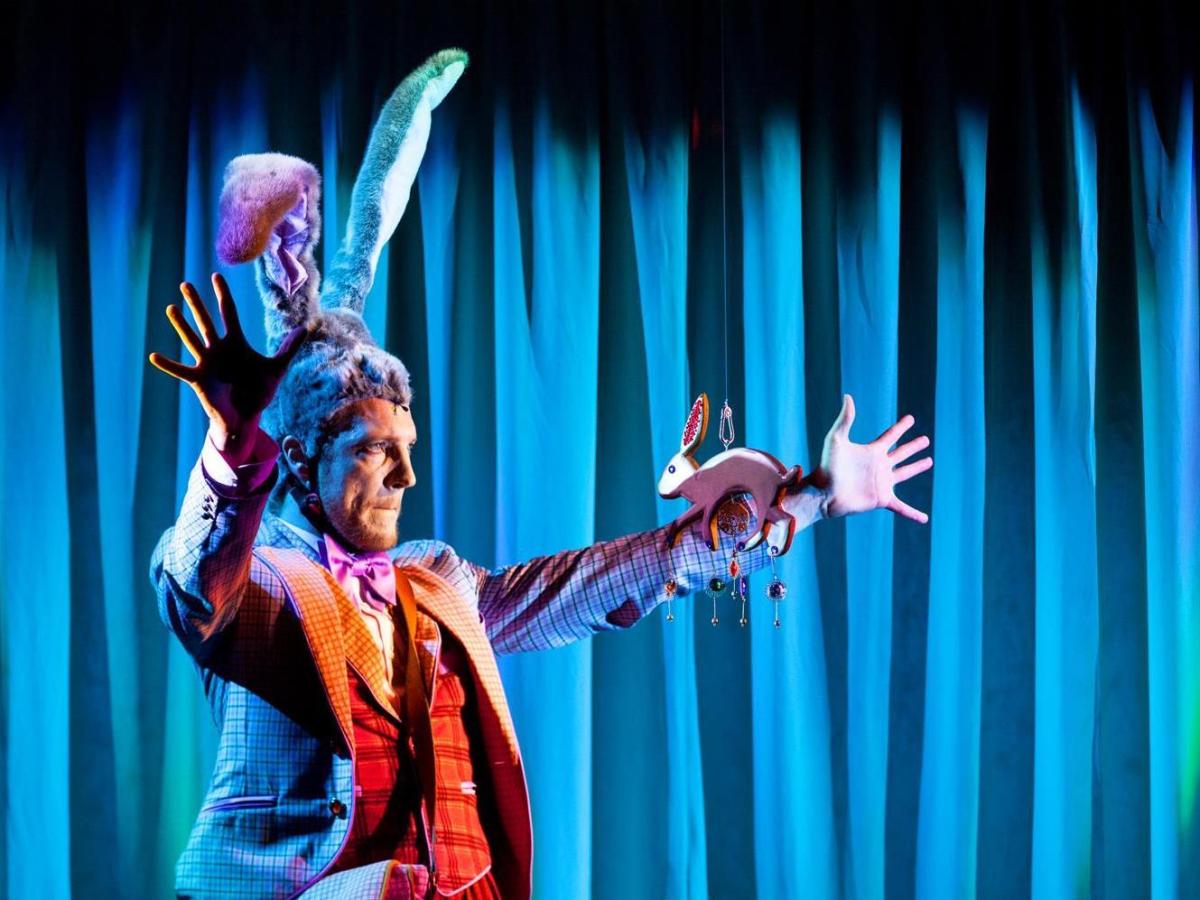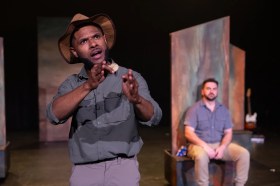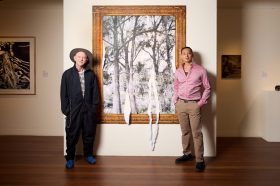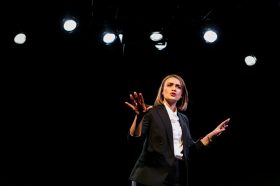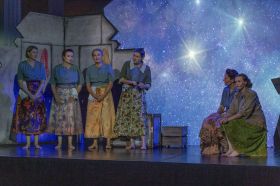Nathan O’Keefe as Jack Hare in Masquerade; photo by Brett Boardman.
Based on Kit Williams’ 1979 children’s bestseller, playwright Kate Mulvany’s Masquerade wears its adaptation on its theatrical sleeve. Set within what might appear as a bookplate, a typographical border that frames the stage, Williams’ book both physically and lyrically propels the narrative, both in the generation of the stage play and the on-stage performances.
Central to the adaptation is Mulvany’s own experience of childhood cancer, which here becomes intertwined with the adaptation. A young boy, Joe (Louis Fontaine) is confined to bed in a cancer ward. The action begins as his mother Tessa (Helen Dallimore) curiously picks up the book and begins to read, fortifying her son’s hopes and setting both scenery and characters in action.
Jack Hare (Nathan O’Keefe) races against time to deliver a token of love from the Moon (Kate Cheel), a Marilyn Monroe-esque figure, to the Sun, equally a riff on mid-20th century popular culture in guitar playing paramour Elvis (played by Musical Director of the on-stage band, Mikelangelo). Linguistically challenged by his inability to enunciate the word ‘love’, the hare journeys through the elements – earth, wind, water and fire – to deliver Mistress Moon’s love token – a jeweled amulet, a treasure that – in the real world – was handmade and buried by Williams, with clues to its whereabouts embedded in each illustrated page; it was discovered in Bedfordshire in 1982, three years after the book’s publication.
The book’s imaginative riddles, like the playwright’s biographical impetus, propel Joe and Tessa’s vivid imaginings. As children’s theatre, the play incorporates shadow puppetry and physical theatre within its rhyming narrative and overly exuberant performances, with Nathan O’Keefe as Jack Hare particularly larger than life.
Comedy is, at times, wryly played. Isaac Newton (Pip Branson), a seeming mix of 17th Century patois and playful lisp, renders drolly: “All my life I seem to have been only like a boy playing on the sea shore and diverting myself in now and then finding a smoother pebble or prettier shell than ordinary, whilst the great ocean of truth lay all undiscovered before me.”
To couch the play as children’s theatre is to narrow its reach. The production is fortified by the on-stage music performed by Mikelangelo and the Black Sea Gentlemen. Anna Cordingley’s set seamlessly and imaginatively incorporates Mulvany’s story, the bed-ridden Joe’s confinement becomes a stage within a stage, a revolving cabin that turns with the movement of the moon and the sun, at once a hospital bed and a projection screen, where original illustrations from the book are a persistent reminder of its adaptation.
But the strength of the production lies in its self-confessed incorporation of biography. The common turn of phrase, to get lost in a book, is turned on itself where a book is also where one finds oneself. Masquerade has become part of Mulvaney’s experience, and endurance. In looking only to its adaptation, the heart of the production may elude us.
Rating: 3 stars out of 5
Masquerade
By Kate Mulvany, based on the book by Kit Williams
Griffin Theatre Company, State Theatre Company of South Australia
Co-commissioned by Melbourne Festival
Playwright: Kate Mulvany
Direction: Lee Lewis and Sam Strong
Music: Mikelangelo and The Black Sea Gentlemen
Designer: Anna Cordingley
Lighting: Geoff Cobham
Cast: Helen Dallimore, Nathan O’Keefe, Louis Fontaine, Jack Andrew, Kate Cheel, Zindzi Okenyo, Pip Branson, Mikelangelo
Southbank Theatre
22-25 October
Melbourne Festival
www.festival.melbourne
8-25 October 2015

